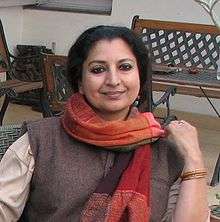Geetanjali Shree
Geetanjali Shree गीतांजलि श्री (she was known as Geentanjali Pandey, and she took her mother's first name Shree as her last name [1]) (born 1957) is a Hindi novelist and short story writer based in New Delhi, India. She is the author of several short stories and five novels. Her novel Mai was shortlisted for the Crossword Book Award in 2001.[2] She has also written a critical work on Premchand.

Personal life
Geetanjali was brought up in various towns of Uttar Pradesh, as her father was a Civil Servant. She claims that it is this upbringing in UP, along with the lack of children's books in English that gave her a rich connection to Hindi.[1]
Works
Her first story, "Bel Patra" (1987) was published in the literary magazine Hans and was followed by a collection of short stories Anugoonj (1991) [1][3][4]
The English translation of her novel Mai catapulted her into fame. The novel is about three generations of women and the men around them, in a North Indian middle-class family. Mai has been translated into several languages, including Serbian and Korean. It has also been translated into English by Nita Kumar, who was awarded the Sahitya Akademi award for the translation, and into Urdu by Bashir Unwan with preface by Intizar Hussain.[1] Other languages include French by Annie Montaut, and German by Reinhold Schein.
Her second novel Hamara Shahar Us Baras is set loosely after the incidents of Babri Masjid demolition.[1]
Her fourth novel, Khālī jagah (2006), has been translated into English ("The Empty Space", Nivedita Menon), French ("Une place vide", Nicola Pozza), and German ("Im leeren Raum", Georg Lechner and Nivedita Menon).
Her fifth and latest novel, Ret Samadhi (2018), leaves readers wonderstruck with its sweeping imagination and the sheer power of language, unprecedented and uninhibited.[5] It has been translated into English ("Tomb of Sand", Daisy Rockwell) and French ("Ret Samadhi. Au-delà de la frontière", Annie Montaut).
Academic publications
- Between Two Worlds: An Intellectual Biography of Premchand [6]
- Premchand and Industrialism: A Study in Attitudinal Ambivalence', The Indian Economic and Social History Review, XIX(2), 1982 [7]
- Premchand and the Peasantry: Constrained Radicalism, Economic and Political Weekly, XVIII(26), 25 June 1983.[8]
- The North Indian Intelligentsia and the Hindu-Muslim Question [9]
Awards & others
Geetanjali Shree is the recipient of the Indu Sharma Katha Samman award [4] and has been a fellow of Ministry of Culture, India, and Japan Foundation. She also participates in theater and works with Vivadi, a theater group comprising writers, artists, dancers, and painters.[1]
References
| Wikimedia Commons has media related to Geetanjali Shree. |
- 'I'm Waiting To Write The Book Which Will Slip Out Of My Grasp' Interview with Geetanjali Shree in Outlook India
- Bent Over Backwards excerpts from Mai - Outlook India
- Mai: A Novel Google Books
- The past is ever present, realized by us in bits: An interview with Geetanjali Shree Deep Blue Ink
- Geetanjali, Shree. "Painting The Ordinary In Myriad Extraordinary Hues". The Book Review India.
- Between Two Worlds Google Books
- The Indian Economic and Social History Review, XIX(2), 1982 Sage Publications
- ICSSR journal of abstracts and reviews Google Books
- The North Indian Intelligentsia and the Hindu-Muslim Question Bibliography of Asian studies